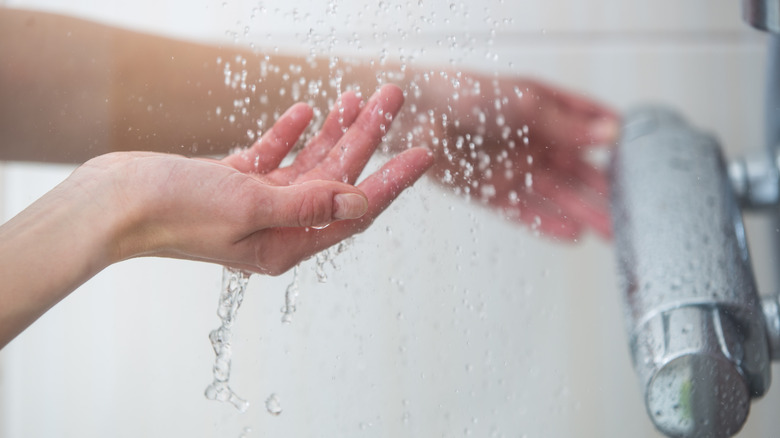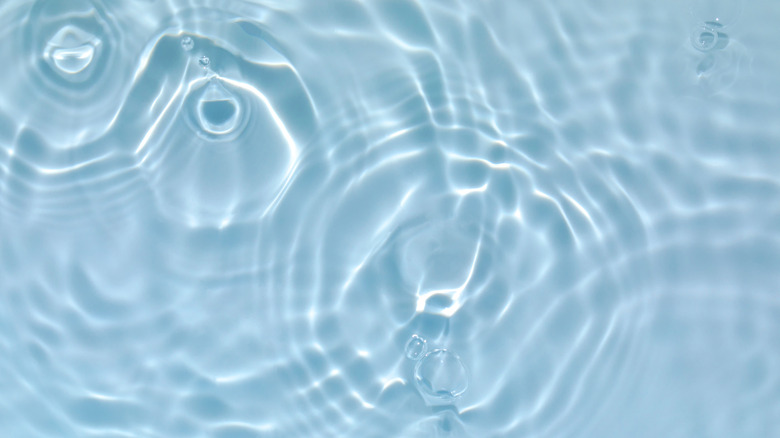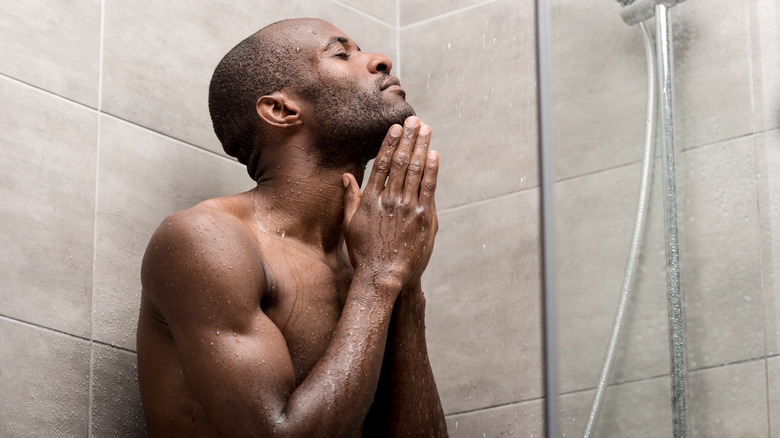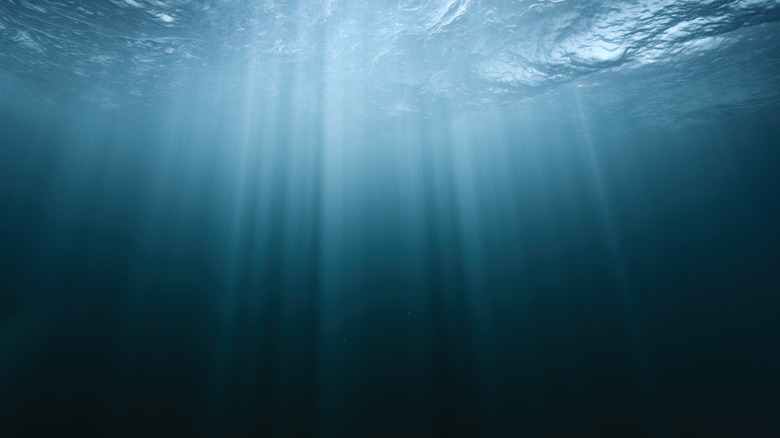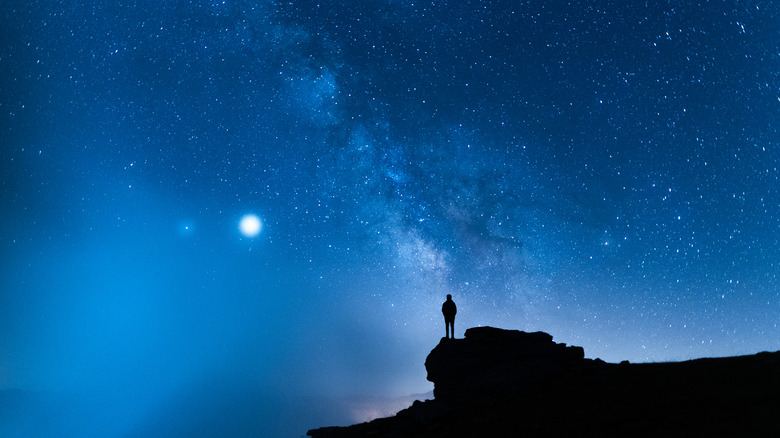The Biggest Theories Behind Why We Do Our Best Thinking In The Shower
The shower is definitely a special, little hidey place for lots of folks. Refuge for the karaoke-embarrassed, steam room for the work-exhausted, go-to for film directors who want to communicate "my character is metaphorically cleansing themselves of the baggage of the past" (cut with camera shots that never wander below the shoulders and/or focus on blood, dirt, or hair circling the drain), and so on. Many creative types and artists have anecdotes about racing from the shower to jot something down, record a tune, make a note, etc., while their partners gaze on and proclaim, "What is wrong with you?"
As it turns out, nothing is wrong (at least in this regard). Overall, it's not too hard to understand, is it? Paying bills, getting groceries, cooking dinner, taking out the garbage, taking care of the kids: how could the mind possibly have enough space to think, wander, and create amidst such relentless cannon volleys of clutter? Creativity requires room to breathe. Countless research, such as that conducted by NYU Professor Amy Whitaker and described to Yale University, point to the drastic need for what author Brigid Schulte calls "strategic slacking," via Insider. Push, produce, strive, struggle, make, go: Such a cruel creed doesn't produce the best results (unshockingly), and makes life a pointless hell, besides.
Solitude, easy and repetitive tasks, the body and its senses, water, and self-care are a whole lot more effective than noses to the grind. This is why the shower is the ideal place to think.
Dopamine in the brain
Before we dip our toes into softer concepts like "mindfulness," let's look at hard, biological factors related to why the shower is such an effective place to think. For that, we turn to a single neurotransmitter: dopamine.
Dopamine, simply put, is one of a host of neurotransmitters connected to overall health and well-being. It's one of the key chemicals in the brain related to mood, focus, attentiveness, motivation, and more, as Healthline describes. A "hyperactive dopamine system," as Web MD puts it, can result not only in someone being abnormally aggressive but can also lead to disorders as severe as Schizophrenia. An underactive system, contrarily, can contribute to lulls in motivation and the onset of crippling disorders such as Parkinson's. The production and quantity of dopamine are related to a whole bunch of stuff, most pointedly genetics and diet. Common sense things like "more protein, less fat" should suffice to help maintain dopamine levels.
And how is the production of dopamine triggered? Well, by doing pleasant tasks like listening to music, light exercise, having sex, and yes, taking a shower, as Very Well Mind explains. Does it shock anybody that any of those things clears the mind and lets it breathe? Remember, though, that all states of being are the by-product of an immensely complex network of bodily systems and neurochemistry. The mere presence of dopamine in the brain doesn't guarantee you any wondrous, ingenious ideas any more than such ideas are dependent by any one, single factor.
Mindfulness and relaxation
Getting back to recovery from modernity's relentlessly haranguing salvo of stupidity and noise: mindfulness. Much like dopamine-related "Use your body to clear your head" constitutes bald-faced common sense that far, far predates the need for medical know-how or explanatory online articles, we're bound to now advise, "Put your cell phone away and jump in the shower and be alone for a bit. It'll do you some good and help you think." This is really all that anyone means by "mindfulness." The shower is the perfect meditative space to let the mind roam.
Artist and author Nancy O'Hara very methodically describes to The New York Times how to focus on showers as acts of self-care. Tips include, "Feel the water as it hits your body, and take a moment to be grateful that you have hot, running water," "Bring to your mind the idea that you are about to cleanse yourself for the good health of your body and mind," and, "Leave all your electronic devices on the other side of the bathroom door." Other sites like The Daily Meditation describe taking deep breaths in the shower, and sites like Gracewood Therapy suggest going slow and ensuring that the water temperature is just right. Little, attentive things.
In the end, showering can't help but clear up some of the gunk clogging the flow of thoughts and feelings. But like many things, patience is key.
The creativity connection
From here we've got to take a look at a term that seems arcane and ill-defined but really isn't: creativity. Creativity isn't merely an attribute that people either have or don't have, like height, e.g., "Greg is tall, Greg is creative." Some people may be more naturally inclined toward original thought, but originality can be cultivated like any other skill, as Dr. Anna Abraham describes in Scientific American. Think musical aptitude. A person born with a "gift" for music still has to learn how to play an instrument or develop their skill, right? Otherwise, no one knows how gifted they are, and the gift affects nothing. Creativity is much the same. It necessitates the right environment to come to the forefront. One key, simple method? Downtime, which includes showering.
As Harvard Business Review summarizes, freedom from time and pressure is essential to creativity. Although, the opposite is also true: too much time and folks will get lazy and not come up with anything. Legendary funnyman John Cleese wrote in his recent 2020 book "Creativity: A Short and Cheerful Guide" that play is the key to creativity. We're talking about letting ideas settle and soak in, even going to sleep while posing oneself a question, and then later on ensuring that you've made the necessary space to let conclusions rise to the surface (interview on CNET). What better, mindful, dopamine-fomenting way to do so than taking a shower? You can even do it every day.
Water within and without
Another critical reason why showering unlocks ideas and the mind? Water — just that. It may sound a bit mystical to say that water is the medium of life, or the "universal solvent" for all planetary biology, as Harvard University states, but it's absolutely true. We are, all of us, mostly water (60 – 70%, as the BBC describes). There are real, physical reactions that occur when the body simply comes into contact with water, especially in the enclosed, sight-limited, womb-space of a shower.
As a group of researchers on Next Big Idea Club describe, immersion in water (a bath might be even better than a shower) occludes visual and auditory input otherwise stuffed with stimuli. It relaxes the muscles, especially if sitting, and bit by bit the mind releases its attention on this and that and opens up more space to take care of tasks and think of things. This is the meditative, mindful state we described earlier, similar to what happens to the body when walking in a forest. Water enhances such states.
This effect provides insight into our planet-wide, pan-cultural relationship between water and spiritual transformation — just ask any Christian who's been baptized. Water plays on the human unconscious and symbolizes our connection to all life on Earth, expansively. H20 molecules can infinitely connect to each other through hydrogen atoms, like the thoughts inside waiting to be built and connected if only given proper scaffolding, space, and reach.
The power of solitude
Showers also provide people with solitude, which is an integral — if not the most integral — facet of creative thought. Solitude is the bane of a modern world characterized by incessant online blather, fragmented and unfocused smatterings of scattered digital information, and artificially amped-up creativity-by-committee brainstorming sessions. Anyone who's craved privacy and solitude as a pathway to peace and creativity — perhaps the more introverted readers — will have approximately zero difficulties understanding why showers are so critical to centering, focus, and a clear mind.
Humans are necessarily social creatures, sure. But, we're limited in our individual ability to effect large-scale, networked goals. In other words, it's easier for one person to make a painting than for a government to collaborate on one. As Inc discusses, solitude is critical to the "flow" needed to complete any such goals, i.e. losing oneself in one's tasks without distraction. "Flow," as a creative state, is practically indistinguishable from mindfulness and meditation. And as The Washington Post reports, according to a 2017 SUNY Buffalo study, creative people seek out solitude more than others. Creative thinkers, therefore, find themselves naturally drawn to actions that will enhance their creativity. Showers might be the one place every day where those people, and anyone else, can actually be by themselves and get a breather.
So what's the lesson here? Take your time, chill out, make space, and exult in your showers. And if you can't ditch your phone, make sure to let the water flow all over it.
